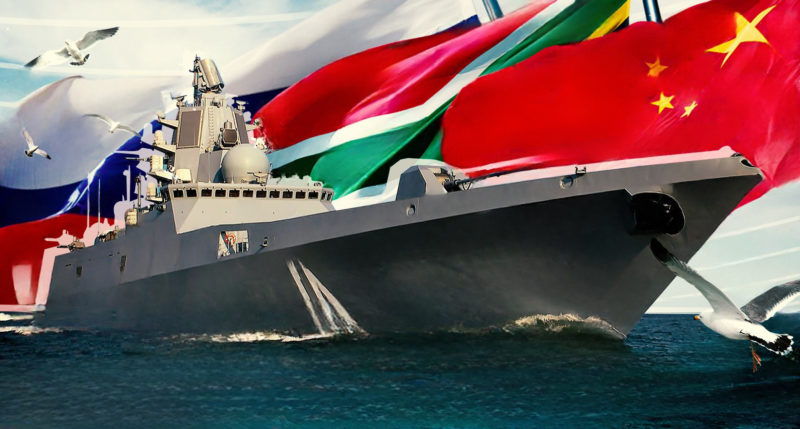Russian Foreign Minister Lavrov's visit to South Africa on Monday, 23 January, and the pre-planned 17-27 February tri-lateral naval Exercise Mosi II (Smoke in Tswana) puts the country's non-alignment to the test as South African Foreign Minister Naledi Pandor meets with Lavrov for "bilateral talks." Lavrov's Southern Africa tour began in South Africa as part of Russia's renewed focus on Africa and is the first visit since Russia's full-scale invasion of Ukraine.
An "appropriate o'clock" for business as usual between Pretoria and Moscow?
Since the Russian full-scale invasion of Ukraine, Lavrov has paid visits to several African nations. Around the first anniversary of the Russian invasion, he is scheduled to visit the continent again, in an intensification effort of Russia's charm offensive.
Clayson Monyela, South Africa's head of diplomacy at the Department of International Relations and Cooperation (DIRCO), acknowledged that Russia may be attempting to woo other African countries because it "feels the need to strengthen ties with Africa. We [South Africa-ed.] already have strong ties with Russia, a fellow BRICS country."
Moreover, Mr. Monyela pointed out that Russia is far from the only country seeking friendship with Africa.
"Show me a country that isn't interested in making friends with Africa," Monyela remarked, referencing the US Secretary of State and the Chinese Minister of Foreign Affairs' latest trips to South Africa.
Many in the international community consider the Russian barbaric, unprovoked, and unjustified attacks on Ukraine as war crimes. Hence, the upcoming tri-lateral naval exercises raise huge concerns and criticism among domestic actors and international partners. However, South Africa's DIRCO continues to assert that the purpose of hosting Lavrov was purely bilateral discussions.
Following Lavrov's visit and several unsuccessful attempts by local officials and the international community to dissuade South Africa's participation in naval drills for Exercise Mosi II, the Russian warship Admiral Gorshkov and several Chinese and South African vessels are currently en route to KwaZulu-Natal for the 17-27 February tri-lateral naval exercise.
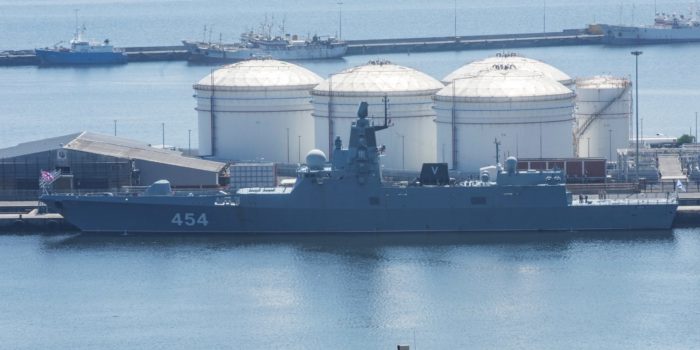
Previously, the number of local government representatives, Desmond and Leah Tutu foundation, the majority of the diplomatic representatives to South Africa, as well as the European Union’s vice-president and foreign minister Josep Borell have actively voiced their concerns and the moral ramifications of hosting Russian ships while Russia is actively engaged in a war of aggression against the neighboring country.
Nonetheless, the South African government downplays the significance of Exercise Mosi II.
According to Clayson Monyela, the meeting with Lavrov was merely a "part of ongoing work in bilateral relations. [And] We're [South Africa] part of BRICS, with China as well in those exercises."
South Africa previously abstained from voting on multiple resolutions against Russia at the UN. Like most African nations, the government contends that South Africa adjoins the non-alignment movement, which makes the country well-positioned and equipped for peace negotiations.
However, this does not preclude South Africa from having bilateral relations with Russia.
"The conflict doesn't stop Russia from having relations with other countries in the world," stated the head of the diplomacy at DIRCO.
Additionally, following a postponement due to last year's war, Russia will host the second Russia-Africa Summit in St. Petersburg in June 2023. South Africa has accepted an invitation to attend the summit, which debuted in 2019.
Previously, Minister Naledi Pandor, when inquired by Russian media whether South Africa would take part in the upcoming summit, responded without hesitance,
"When we are invited through the African Union, we do tend to attend all summits that involve our African leaders. And Russia being such a friend of South Africa, I can't imagine that we wouldn't participate."
Russia carries a great deal of interest in Africa and South Africa in particular, as Russia currently yearns for greater political backing from the Global South more than ever during its vicious war against Ukraine.
Furthermore, South Africa has a plethora of resources to offer. Russia eagerly seeks to acquire these resources given its current significant economic and political woes and decline perhaps slower than anticipated. Nonetheless, it is fast approaching imminent and soon-to-be complete state collapse.
Meanwhile, the possibility of strengthening ties between South Africa and Russia remains. However, the vital issue is whether South Africa will benefit from such cooperation and to what extent. And most importantly, how it will impact ongoing Russia's unprovoked, full-scale war against Ukraine and directly on any potential future of Ukraine-South Africa relations.
War in Ukraine: propaganda narratives bridging the gulf between Pretoria and Moscow
South Africa's current posturing on Russia's war against Ukraine and diplomatic relationships with Russia can be viewed from the perspectives of morality and self-interest.
- First, from a moral standpoint, the country's current diplomatic stance contradicts South Africa's incredibly powerful and high post-apartheid moral compass.
- Second, from the perspective of the country's self-interest, particular posturing is ineffective and counterproductive. South Africa conducts a negligible amount of trade with Russia. The latest European Commission and South African Parliamentary Monitoring Group (PMG) data shows that the EU is the country's largest trading partner. At the same time, Russia accounts for less than 0.7% of South Africa's imports.
Russia has not made substantial economic contributions to South Africa alone, but it also has little to offer the entire African continent economically and politically.
It is deplorable that for historical reasons, such as Soviet anti-apartheid struggle assistance and future proposed "cloud castles," South Africa subscribes to a false narrative promoted and propagated by Russia.
According to Darren Bergman, the Shadow Minister for International Relations and Cooperation and member of the Democratic Alliance (DA), the country's official opposition party, South Africa's foreign policy is "stuck in the past" and the Cold War. It was when the Soviet Union supported the African National Congress (ANC) and the anti-apartheid struggle.
. South Africa, China, and Russia share a common cause with the following narratives. It explains the cooperation ties between the countries within this context.
For instance, some of them include:
- Russia can provide an alternative, more prosperous future.
- South Africa, and other African nations, together with Russia, yearn for a multipolar world. Russia offers an alternative system of governance superior to Western dominance.
- The false Russian assertion that it is conducting a defensive war in Ukraine against neo-Nazi proxies posing as NATO forces.
- Another frequently circulating narrative, including in South African academia, is that Ukraine is caught between two powers and a victim of another Cold War 2.0.
- Russia's war against Ukraine is a European problem far removed from Africa's problems. European problems are not the world's problems by default. Therefore, since South Africa is a sovereign nation, its membership in BRICS must be considered. In the upcoming article, we will discuss Russian propaganda and false narratives in South Africa and on the African continent in greater detail.
Four towers of Kremlin propaganda: Russia, Ukraine, South, West
The general impression was that another standard narrative was employed again during the bilateral discussions, and "the gulf between Pretoria and Moscow was bridged even further." The rhetoric was generally devoid of calls for Moscow to withdraw and respect Ukraine's sovereignty, like those made on 24 February 2022 when Russian tanks rolled into Ukraine, which allegedly led to President Cyril Ramaphosa's discontent.
Thus, it became evident that 24 February was the South African government's final attempt to criticize Russia. This time, Minister Naledi Pandor voiced no concern about barbaric Russian attacks on Ukrainian civilians.
Several fact-finding missions by different government representatives took place in 2022, including DA leader John Steenhuisen's visit to Kyiv when he asserted that it was his duty to speak for South Africa. Another meeting between South African politician and businessman Mmusi Maimane, the leader of One South Africa (OSA) political party, and his counterpart from Ukraine's European Solidarity opposition party, the fifth Ukrainian President Petro Poroshenko.
Geordin Hill-Lewis, the mayor of Cape Town and a member of the DA, has also voiced support for Ukraine against Russian aggression. Consequently, he demanded in vain in October 2022 that the government prevent a Russian oligarch sanctioned by the EU and the US from docking his yacht in the city.
Unfortunately, the various attempts and interventions above drew large pushback from many South African government officials. Most believe these interventions have crossed the line from mere policy disagreement to attempting to run their foreign policy locally.
“You don’t expect a local party running a metropolitan or province to adopt a different policy,” commented on the issue Clayson Monyela.
During the Pretoria-Moscow bilateral talks, mass graves, murders, torture of adults and children, rape, forced deportation, forced and illegal adoption of children, and forceful cornering of Ukrainians into Russian citizenship was likely left entirely off the table.
While South Africa's government position remains largely nebulous, the vast majority -- 74.3% of South Africans, according to the most recent Brenthurst Foundation survey -- condemn Russia and its war against Ukraine.
However, specific circles, political parties, veterans, and some young people are ardent supporters of Russia. Hence, South Africa's wartime diplomacy is unquestionably influenced by societal divisions.
Consequently, South Africa continues to offer assistance in mediation and facilitation of potential peace talks in Russia's year-long war against Ukraine. The mediation proposition offers South Africa another opportunity to save face once again.
One must be considerate of South Africa being a sovereign state and a member of BRICS and respect the country's choice. South Africa is an important actor in the international arena with a wealth of valuable and practical experience to offer to the international community of states.
Hence, South Africa remains the right fit for a valuable future mediator, but Mzansi will need to recognize the necessity of Russia's complete withdrawal from Ukraine.
According to an independent analyst and African foreign policy expert, Dr. Leaza Jernberg, South Africa views itself as a representative of African countries on the international stage, and "there's a lot of concern that we're [South Africa-ed.] not seen as pro-Western."
Hence, the country's diplomatic approach could be explained by the country's assertion of independence from the West.
At the same time, even though "the West underestimates the more you tell African countries to do something the more there's pushback, there's a lot to be lost [for South Africa-ed.], but not much to be gained [from closer ties with Russia-ed.]," concluded Dr. Jernberg
Trilateral naval drills: Russia "muddying the waters" of SA's neutrality under a cloak of secrecy on its invasion anniversary
On Wednesday, 15 February, a Russian warship anchored in the harbor of Cape Town, much to the mayor's dismay. Cape Town’s Executive Mayor Geordin Hill-Lewis's response was stating "voetsek."
We are not hosting this warship, nor is it welcome in the Mother City. Cape Town will not be complicit in Russia's evil war. @PresidencyZA must answer for his complicity. #RWSGFY #VoetsekRussianWarship https://t.co/3XOu82xOAL
— Geordin Hill-Lewis (@geordinhl) February 13, 2023
Following a backlash over the Russian consulate's Twitter post, which included a photo of the Admiral Gorshkov battleship arriving in Cape Town. The battleship was seen against the iconic backdrop of Mother City's Table Mountain.
https://twitter.com/RusConsCapetown/status/1625470705562185730?s=20
In mid-January, the Desmond and Leah Tutu Foundation and Archbishop Tutu Trust urged South African President Cyril Ramaphosa
to "demonstrate leadership" and cancel the forthcoming military exercises with Russia and China.
The foundation and the trust issued a joint statement reading that the joint naval exercises were "tantamount to a declaration that South Africa is joining the war against Ukraine on Russia's side."
Despite the calls from various communities, diplomats, politicians, anti-apartheid, and human rights activists, South Africa forges ahead with a 10-day joint naval exercise this Friday, 17 February. The tri-lateral drills will likely further strain the country's relations with the US and Europe.
The tri-national naval drills fall on the first anniversary of the Russian invasion of Ukraine. Both domestic and international observers have openly criticized the maneuvers. They contradict South Africa's self-proclaimed "neutrality" in Russia's war against Ukraine.
The name "Mosi" (Smoke) was used for the first time in November 2019 when the three countries held a naval exercise in South African waters off the Cape of Good Hope in the Atlantic near Cape Town. Russia sent the Slava-class cruiser Marshal Ustinov and the tanker Vyazma to participate in the inaugural Mosi exercise.
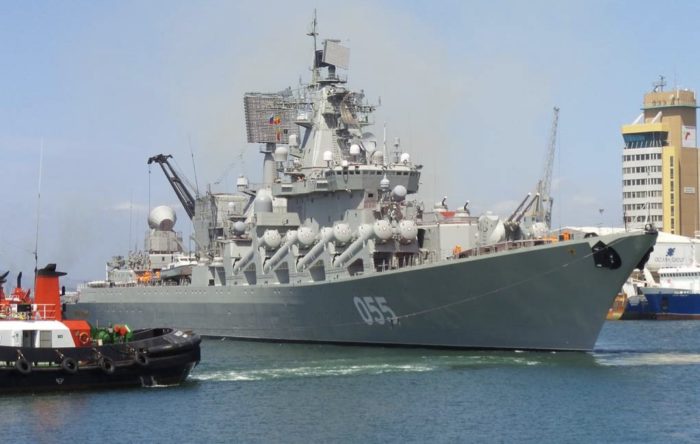
Dean Wingrin, a specialist naval correspondent for DefenceWeb, cautions that this time all sides' advanced electronic warfare, communications, and weapons systems would be turned down "to a sort of peacetime setting"; from a tactical intelligence perspective, regardless of how friendly the other nation is, specific weapon characteristics should not be discoverable.
According to senior SANDF officials, ridiculing the uproar, Exercise Mosi II is comparable to military exercises conducted with other nations. South Africa previously conducted similar exercises with the US in June and France in November last year.
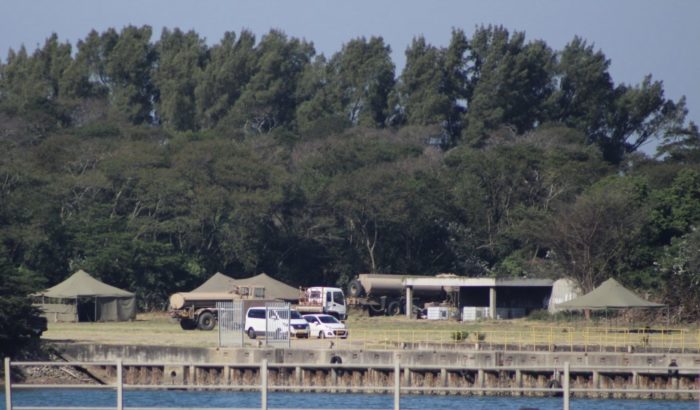
“The purpose of the exercise was to keep the SANDF in good shape. We want to learn from others as much as they will want to gain experience from us,” stated the top military official Lieutenant-General Michael Ramantswana.
Additionally, Siphiwe Dlamini, Head of Communication (HOC) in the Department of Defence (DoD), is concerned about other "media attempts to conflate" also the upcoming next week's Armed Forces Day (AFD) with the tri-nation naval exercise Mosi II.
The naval exercise is a “military marrying up exercise, one of several the SANDF conducts with militaries around the world on a regular basis, to ensure it can learn from and benchmark its own operating capability. None of this is sinister, nor suggests any agenda over and above ongoing improvement of SANDF capabilities in executing its constitutional mandate of safeguarding the territorial integrity of this country,” emphasized Siphiwe Dlamini.
New developments and active participation in the naval drills indicate a change from the initial response, in which South Africa called for Russia to leave Ukraine.
Darren Bergman, Shadow Minister for International Relations and Cooperation and Member of Parliament for the country's official opposition party, the Democratic Alliance (DA), called the government's claim that it is non-aligned rather than neutral a pure "semantics."
“You can't call that neutral," stated Darren Bergman.
Bergman questions the moral implications of welcoming Russian ships while that country is at war against its neighbor.
"What if a Russian ship goes from this exercise [in South African waters] straight to Ukraine, how would South Africa feel then? Just thinking about it makes me feel sick," asserted Darren Bergman.
Previously, the Suez Canal Authority proclaimed neutrality. Despite the war, it did not restrict Russian ships' access to the canal.
In Washington earlier, the White House has also expressed concern regarding South Africa's military plans.
“The United States has concerns about any country exercising with Russia as Russia wages a brutal war against Ukraine,” stated the White House press secretary Karine Jean-Pierre.
Previously, the South African National Defence Force (SANDF) declined the opportunity to conduct the naval exercise with the US. It was revealed in early February by Rear Admiral Chase Patrick, Director, Maritime Headquarters, US Naval Forces Europe-Africa, during a media briefing on Nigeria's recently concluded Exercise Obangame Express 2023.
“In terms of our relationship with South Africa, we’re always keen to build – to building and growing that relationship. We do make it a point to send our ship in port to that country anytime that we circumnavigate the continent. And in fact, we did have the Hershel ‘Woody’ Williams there just – I think just this past fall and that’s not the first time we’ve done that. So any opportunity we get to actually exercise with our partners in South Africa, we do seek that,” stated Rear Admiral Chase Patrick.
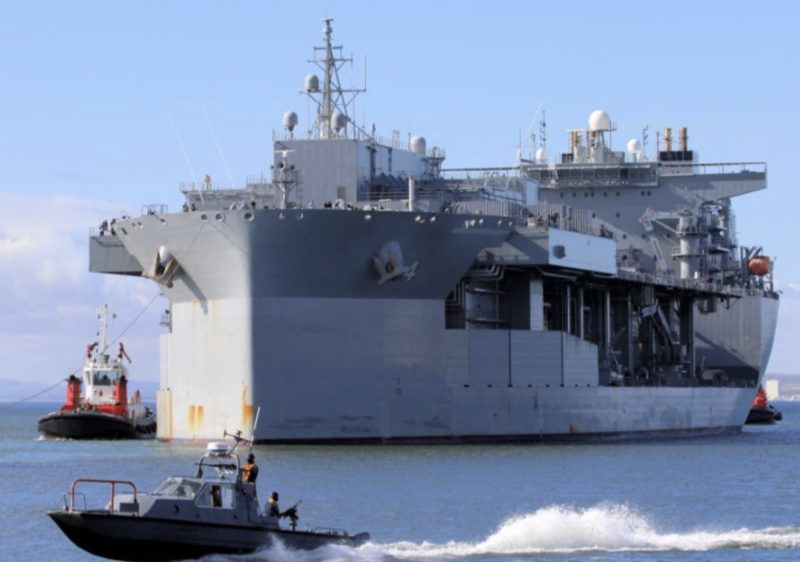
Thus, the ruling African National Congress (ANC) party's decision to engage with Russia, which is currently regarded as a pariah state by the majority of the international community, has alarmed many South Africans, who are concerned that it could harm the country's relations with other democracies.
Exercise Mosi II tests Western patience. Last year, South Africa abstained from all UN General Assembly resolutions condemning Russia's aggression against Ukraine, causing widespread discontent.
However, the Western partners refrained from a harsh response out of concern that it would only further drive South Africa deeper into the Russian camp. This week, however, the fast-approaching Exercise Mosi II suggests that Pretoria is already trending in that direction. It prompts some Western governments to reevaluate their South African approach.
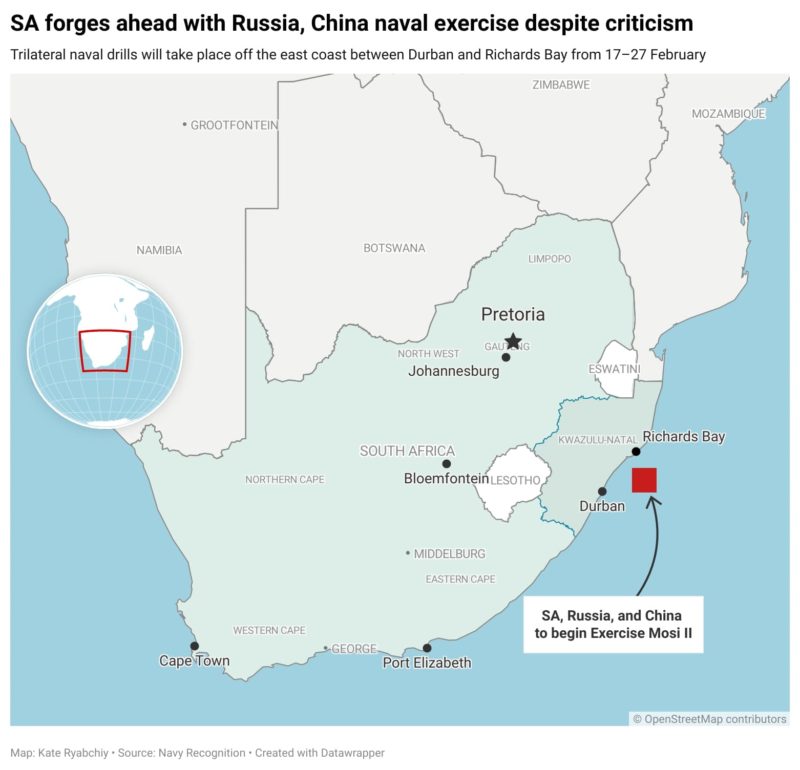
- The joint Russian/South Africa/Sino naval exercise will cover the sea area of 87 nautical miles (or 160 kilometers) between Durban and Richards Bay, the coastal province of Kwa-Zulu Natal.
- According to SANDF, up to 350 personnel from the South African side will participate in the training.
- The costs of the exercise will be deducted from the SANDF's R1,637 billion ($91 billion) combat capability's line-item target of 8,000 hours at sea during the 2022/2023 fiscal year. They spent approximately 10,000 hours at sea the prior year. Operating a single frigate costs R410,000 ($22,719) per day.
- The maritime part of the exercise will involve search and rescue, vessels in distress, force protection, and air defense drills; gunnery, force protection, and air defense; the ship-to-ship helicopter flights as interoperability practice and probably anti-piracy drills. Moreover, the first three of South Africa's nine new maritime domain awareness satellites, launched a year ago to improve surveillance of South Africa's economic exclusion zone and track illegal Chinese trawlers, are also likely but almost invisible components of the exercise.
- From the Russian side: beyond already promised and present "cutting edge" 4,550-tonne vessel with a crew of about 210, frigate Admiral Gorshkov and its replenishment oiler (support tanker) will be taking part in Mosi II. Admiral Gorshkov possibly carries an "unstoppable" Zircon (Tsirkon) missile and other types of missiles.
- From the Chinese side, according to recent information, three vessels will be present: the 7,500-tonne guided-missile destroyer Huainan, the 4,200-tonne guided-missile frigate Rizhao and the supply ship Kekexilihu.
- From the South African side, at least three vessels will participate, including the 1,031-tonne SAS King Sekhukhune I, the new Durban-based inshore patrol vessel armed with a 20mm cannon for self-defense, which entered service in 2022, and the aged hydrographic survey vessel SAS Protea, which to be replaced soon by SAS Nelson Mandela. Additionally, one can expect the 3,759-tonne frigate SAS Mendi and one of South African three submarines also planned to participate in Armed Forces Day at Richards Bay on 21 February.
However, the SANDF previously stated that the South African Navy would contribute one frigate to the exercise. It is unclear whether this represents a plan change. Comparatively, if the additional anticipated Russian and Chinese ships arrive, South Africa would still be vastly outgunned and outclassed, raising the question of what possible benefit it could derive from the potentially unbalanced exercise.
One of the ships is Russian Admiral Gorshkov, which entered service in 2018 and set sail this January. The Russians often dub it a "state-of-the-art" frigate. Hence, she is set to demonstrate the "unstoppable" hypersonic Zircon (Tsirkon) anti-ship cruise missile that can evade anti-missile defenses.
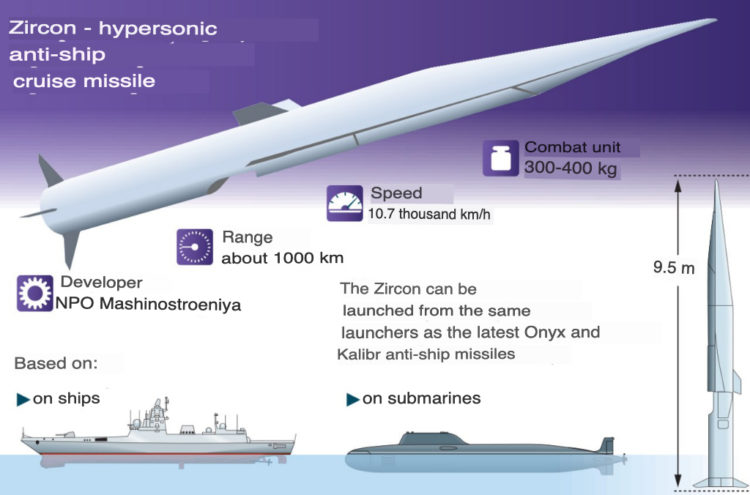
Hypersonic Zircon is also rapidly being developed in countries like China, France, and the US. The weapon, which Russia claims can reach speeds of Mach 9, could be effectively unstoppable if used correctly, making any ship vulnerable to destruction. If the Zircon's claimed range is accurate, a capital ship could be sunk by an enemy as far away as Durban is from Cape Town.
Such hypersonic missiles have a claimed accurate targeting range of around 1,000 kilometers. Zircons can be tipped with nuclear weapons with a yield of 250 kilotons. However, one of the world's most trusted defense publications, Jane's, suggests that Mach 5 and a range of around 600 kilometers are more "probable."
The range and speed of a Zircon are as mysterious as the rest of the missile's major characteristics. Since it has never been independently observed in action. The Russian Ministry of Defense has only released grainy footage showing its use up until this point.
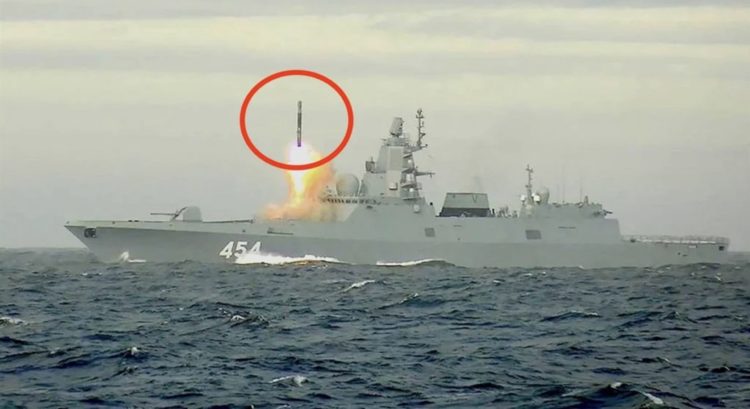
An unidentified South African official said this would be the first-ever event of its kind, but the launch has yet to be confirmed.
However, the South African National Defence (SANDF), which was approached for comment last week by an independent South African online news publication, Daily Maverick, stated that “according to the Protocol agreement signed by the three countries, there is no planned launch of any missile during Exercise Mosi II.”
Propaganda exercise: Russian classic "Potemkin Village" ruse
The Zircon missile is a powerful hypersonic weapon that moves too fast for existing defenses to stop it. Unlike an ICBM, it can fly at low altitudes and has a scram-jet propulsion system. Additionally, frigate Admiral Goshkov possibly can be "cutting-edge."
However, there are some old tricks that Russia has traditionally applied throughout its history. One such tale is the famous 1787 Crimea visit by Empress Catherine II. The Russian governor Grigory Aleksandrovich Potyomkin-Tavricheski allegedly built fictitious settlements to hide the decaying state of the Russian towns. The scheme, known as a "Potemkin Village," involved building painted facades that resembled real villages, complete with contented residents for the viewing pleasure of visiting officials.
The genuine concern is that South Africans impressed by Russian showcasing at the military drills will fall into another "Potemkin Village" trap.
As MP with the DA, and the current Shadow Minister of Defence and Military Veterans, Kobus Marais, stated that Russia’s hypersonic missile testing is making South Africa "complicit in their [Russian-ed.] war crimes. Russia's clear objective with Exercise Mosi II is to abuse SA for their propaganda against the West," added Kobus Marais.
- First, Zircon is an expensive naval weapon, and the Russian war against Ukraine is primarily a ground war. It is one of the reasons Admiral Goshkov is playing around Richard's Bay instead of being engaged in the war.
- Second, a hypersonic missile cannot be detected by radar. It also can mean that it cannot use onboard sensors to track a target vessel during the primary flight stage. Such missiles must fly higher than conventional missiles, which in this case, it might mean that Russian Zircon's payload may be less impressive than advertised.
- Third, “fielding the Zircon will do little to change Russia’s immediate fortunes in its ongoing war,” according to the Royal United Services Institute (RUSI). One cannot redeploy the missile-carrying vessels to the combat zone around Ukraine via the Bosphorus Strait. Even if they could, there are insufficient targets within Ukraine's civilian infrastructure to justify using a limited number of expensive missiles. It is evident on Ukraine's battlefield. Theoretically, Russia possesses an abundance of superior equipment, but we rarely observe it on the battlefield. Numerous missiles designed a decade ago are now indiscriminately striking civilian buildings, a propaganda narrative South Africa often falls prey to and a tactic it tacitly endorses.
According to analysts, the knowledge of Zircon's capabilities could influence Western countries' foreign and military policies. And it possibly can be that South Africa may soon become a key source of information regarding these capabilities.
However, the overall perception that South Africa's magic as human rights and liberation struggle champion is sadly dwindling. And there is absolutely nobody to stop this havoc train. It leaves one in a state of despair. If the spirit and legacy of the late Archbishop of South Africa and Nobel Peace laureate Desmond Mpilo Tutu, the icon of the anti-apartheid movement and human rights activism, urging us and not getting through. One is left empty and lost. It becomes challenging to recognize, if not this, what will save us from the "Potemkin Village" ruse in today's incredibly fragile world.
Related:
- South Africa may be secretly selling arms to Russia – The Telegraph
- Moscow Patriarchate says it has churches in 19 African countries, angering Orthodox world but giving FSB expanded possibilities
- Ukraine launches initiative to feed African countries on Holodomor commemoration day
- Russian university accused of pressure on African students to join the war – The Daily Beast
- Morocco to become first African country to provide military aid to Ukraine – media
- Moscow Patriarchate moved into Africa to provide cover for FSB officers and PMCs, not to punish anyone over Ukraine, Horyevoy says

